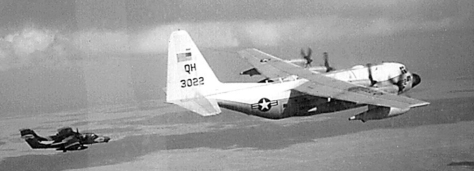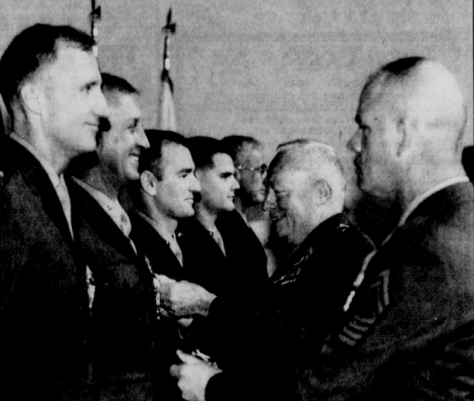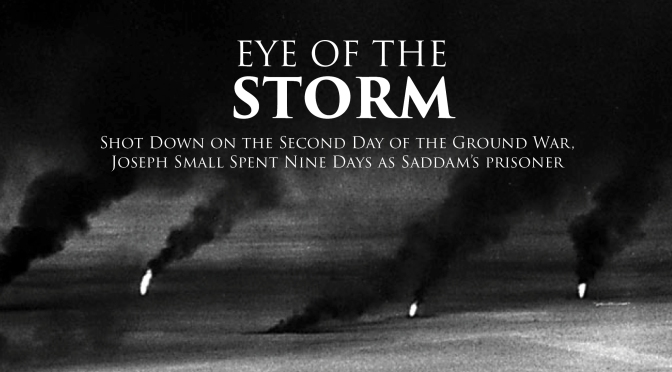By Joe Hanneman
MAJ. JOSEPH SMALL III GREW CONCERNED as he peered out the windshield of his U.S. Marine Corps OV-10 Bronco reconnaissance plane, cruising low over enemy territory just inside Kuwait. It was early afternoon, Feb. 25, 1991, the second day of the Allied ground war. It was an all-out assault against Saddam Hussein’s Iraqi forces, who held the tiny oil-rich nation with an iron grip. But unlike the clear skies on the first day of the ground offensive, the weather had turned ominous.
Small lowered his twin-engine turboprop plane to about 4,500 feet. He was just beneath the low, stormy cloud ceiling and in the midst of thick, sooty smoke from the oil-well fires that scorched the earth below. He didn’t like being this low in a plane that flew only about one-fourth the speed of a U. S. fighter jet. He’d been the target of two Iraqi surface-to-air missiles on a previous mission, but was never low enough to really worry about being hit.
Today was different.
Small and his aerial observer, Marine Corps Capt. David Spellacy, were searching for an Iraqi tank column that had slowed the advance of the 1st Marine Division’s 1st Tank Battalion into southwest Kuwait. They set up a search pattern, and planned to call in air and artillery strikes on the tanks once they found them. While Spellacy surveyed the desert floor below, Small kept “jinking” the plane in erratic movements, hoping to make the aircraft a difficult target for Iraqi gunners.

After a few minutes of searching, they came upon a large, trench complex dug into the sand below. They were close enough to see soldiers moving about on the ground.
SMALL QUICKLY REALIZED HE’D STUMBLED ONTO a hornet’s nest of Iraqi troops, and was flying low enough to get stung. While Spellacy took down target coordinates, Small thought about getting the plane out of there. It was too late.
Screaming from the ground at 5 o’clock, a shoulder-launched surface-to-air missile ripped into the right wing, killing Spellacy and crippling the aircraft. “I remember a loud explosion,” Small said. “It felt like a giant hand came out and smacked the airplane, like swatting a fly. I remember a brilliant, white light, coming from somewhere. The airplane was instantly, completely out of control.”
Not knowing Spellacy’s condition, or that the plane’s right wing had been blown off, Small tried to regain control of the craft. It didn’t work. Racing against time, Small pulled the eject handle. Within a second, both men rocketed free of the crippled airplane, 3-5 miles inside enemy territory. “I don’t remember any noise,” Small said. “My next conscious thought was when I was under the parachute.”
Small’s duty in Operation Desert Storm was the first combat assignment for the Racine native and 1975 UW-Parkside graduate. He’d arrived in Saudi Arabia on the first day of the air war, Jan. 17, with Marine Observation Squadron 1 from New River, N.C. Typically, he flew one mission per day. He’d leave the airstrip near the port city of Jubayl each day for a 4-hour flight, mostly patrolling the Kuwait-Saudi border and mapping enemy tank and troop locations. 
IT WAS A LONG WAY FROM TINY SYLVANIA AIRPORT in Racine County, where Small fulfilled his dream of earning a pilot’s license on the day he graduated from UW-Parkside in December 1975. During his 17 years in the Corps, he’d flown other dangerous missions. He flew a helicopter on search-and-rescue missions to aid survivors of Hurricane David in the Dominican Republic in 1979. On one mission, his helicopter ended up belly-deep in mud as survivors rushed the craft to get at relief supplies.
He also flew drug interdiction missions in cooperation with the U.S. Customs Service and the Coast Guard in 1987. On one mission, he stumbled onto an air-to-boat drop of drugs, and guided law enforcement to the scene. The dealers were caught and convicted. Another time; another enemy. Now, floating into the hands of the Iraqis, Small pulled his survival radio from his vest and got off a quick mayday, noting his location. Now all he could do was wait to hit the ground.
When he landed, Small tore ligaments in his knee, and suffered a deep cut on his forearm. He laid on the ground, facing up. Within seconds, a dozen Iraqi soldiers were all over him. There was no running. “Evidently, the sound of my aircraft crashing got them out of their holes. Why they didn’t shoot – to this day I don’t know.”
After disarming him and removing his survival vest at gunpoint, the soldiers put Small in a land rover and drove north. A soldier in the front seat had his rifle pointed at Small’s face. A rival group of soldiers in another vehicle tried to run them off the road. Small looked to one of his captors for a clue to what was happening.
“He looked at me and said, ‘They’re crazy. They want to kill you.’ ”
SMALL WAS TAKEN TO AN UNDERGROUND BUNKER complex several miles away. He waited about 45 minutes as the Iraqis figured out what to do with him. One of the soldiers held a cigarette to his mouth for a few puffs. After taking his flight suit and gear, they dragged him up the stairs and stuffed him into another vehicle.  This time, the destination was Kuwait City. At a building in the center of the Kuwaiti capital, the soldiers sat Small in the center of a room for another round of interrogation. The cloth strips used to bind his hands dug into his wrists, causing deep lacerations. The beating started off with cuffs to the ears and back of the head. They administered what Small called “a pretty good whooping,” but they never struck him in the face. After being led into another room, he was whipped with what he believed was a fire hose. One soldier hit him in the back of the head so hard it knocked him out cold.
This time, the destination was Kuwait City. At a building in the center of the Kuwaiti capital, the soldiers sat Small in the center of a room for another round of interrogation. The cloth strips used to bind his hands dug into his wrists, causing deep lacerations. The beating started off with cuffs to the ears and back of the head. They administered what Small called “a pretty good whooping,” but they never struck him in the face. After being led into another room, he was whipped with what he believed was a fire hose. One soldier hit him in the back of the head so hard it knocked him out cold.
“I figured they were going to beat me, then shoot me,” he said.
Small remembered what he had read about POWs in Vietnam, and how American soldiers answered questions by being vague or telling lies. It was a technique he would use often during his interrogation; a technique he later credited with saving his life. When the Iraqis found his flight map among his belongings and began questioning him about what it meant, Small said he told the “biggest, grandest lie I think I’ve ever told in my entire life.” It worked.
After that session ended, Small was again loaded into a vehicle and driven from Kuwait City to Basra in southern Iraq, headquarters of Saddam’s elite Republican Guard. They traveled up a darkened Highway 6, which would within two days become known as the “Highway of Death,” as Allied pilots destroyed scores of retreating Iraqi vehicles.
During the next interrogation, Small was not beaten, but was threatened with death if he didn’t cooperate. The next morning, Small was put into a car and driven to Baghdad. He was afraid during the daylong drive – afraid that U.S. planes might spot them on the highway and bomb the vehicle. Luckily for him, the weather was bad and no planes were visible. “Again,” Small said, “God was on my side. He kept the weather bad. Had the weather been nicer, I’m sure we wouldn’t have made it.”
SMALL ENDURED ONE LAST ROUND OF QUESTIONING before being sent to a POW prison. Guards who led him to the questioning hit him in the head, and purposely made him walk into walls or trip on the stairs. He was unsure what the Iraqis had in store for him. He had seen the pictures of captured Allied soldiers on CNN, soldiers who’d been beaten bloody and forced to read statements condemning the war. He knew what could happen. Then the questions ended. Small was taken to a dark, cold prison and left in a cell by himself. It had been 30 hours since he was shot down, and the impact of his ordeal caught up with him. He sat in his cell and wept.
He found only restless sleep that night, on a small square of foam padding that served as a bed. The night was interrupted by U.S. air raids that drew loud anti-aircraft fire from inside the prison compound. Having hit rock bottom emotionally, Small sat in his 12-by-12 cell and prayed. It was about the only comfort he’d found since being captured. He was making peace with God. “I figured that was it; I was done.”
Although his cell door had a blanket draped over it to keep him from seeing out, Small on occasion heard muffled whispers from other cells. At one point, he heard his name whispered. Someone must have heard him announce his name to the guards when he came in the night before. In between visits by his captors, Small discovered there were five other Allied pilots in his wing of the prison. Slowly, they exchanged information in whispers. He filled them in on the progress of the war. A couple days later, two more prisoners were brought in. The men worked to keep each others’ spirits up. On occasion, Small’s guard would give him a cigarette. He even brought him some hot tea on evening. “That was a good day,” Small said.
THE FIRST HINT THE WAR WAS OVER was when the bombing stopped. The prisoners heard the report of small arms fire in Baghdad, a traditional Muslim sign of celebration. On the night of March 4, all the prisoners were gathered, put on a bus and driven to another prison in Baghdad. A representative of the Red Crescent (similar to the Red Cross) was taking down everyone’s name. Prisoners were allowed to shave, then were blindfolded. 
They were loaded onto a bus, and told they were now in the custody of the International Red Cross. It was finally ending. “That was the first time I really believed it,” Small said. They were put up at a luxury hotel for the night, and treated to hot showers and good food. The next day, they were loaded onto a Swissair plane and took off for Riyadh, Saudi Arabia.
Near Saudi airspace, the commercial jet was joined up by two American F-15 fighters, which flew in tight formation as an escort. The pilots raised their helmet shields and gave a thumbs up. They broke away and were replaced by two British Tornado fighters. Their first official welcome home was a stirring sight for all on board. “It was the happiest day of my life, boy. We let out a whoop.”
When Small descended the steps at the Riyadh airfield, U.S. Army Gen. H. Norman Schwarzkopf, the Allied commander, was waiting to greet the POWs. The big, burly four-star general had tears streaming down his face.
AFTER A CHECKUP ABOARD A U.S. HOSPITAL SHIP near Bahrain, Small and his comrades flew a VIP plane to Andrews Air Force Base, Md. Waiting there were thousands of people, including his wife, Leanne, their children Lauren, 10, and Michael, 8, his son, David, 17, and his parents, Joe and Dolores Small of Racine.

Despite his valor and bravery, Small refuses to call himself a hero. And it’s not just modesty. He says many other soldiers have withstood much worse than he, including Vietnam POWs who didn’t come home to the adulation of the American public. That’s a message he’s carried to dozens of speaking engagements since the war ended. He’s also had difficulty dealing with the death of Spellacy – known as “Hank” in his unit – who left behind a wife and three young children. Small described his partner that day as the “greatest guy you’d ever want to know.”
Small has experienced “survivor guilt” and wondered if there’s anything he might have done to change the outcome. He knows there are no answers. “He was sitting three feet behind me. He got hit and I didn’t. God had something for me to do and God had something for Hank to do.”
Small, 41, was stationed in Florida after the war, training future Navy and Marine pilots at Pensacola Naval Air Station. (He retired from the Corps in early 1994 and started life as a civilian.) Small hopes his POW experience and willingness to talk about it will one day help some future soldier survive imprisonment in an enemy camp.
“If I can have some influence at some time on someone who may go through this 10, 15, 20 years from now … that’s what’s going to make it all worthwhile.” ♦
This story originally appeared in the Spring 1993 issue of Perspective magazine at the University of Wisconsin-Parkside


